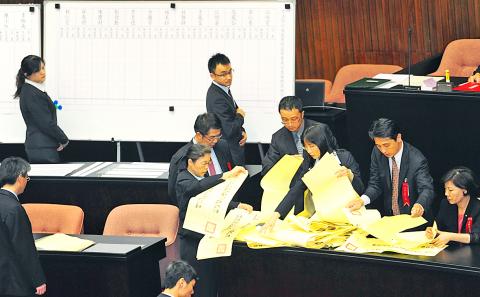Eleven Control Yuan candidates nominated by President Ma Ying-jeou (馬英九), from a list of 29 that has been described by opposition parties as “the worst roster in history,” were voted down by the legislature yesterday.
The vote took place after a blockade by opposition parties in the early morning and subsequent cross-party negotiation led the Chinese Nationalist Party (KMT) to agree not to enforce party discipline on how its legislators voted.
The Democratic Progressive Party (DPP) and the Taiwan Solidarity Union lawmakers arrived on the legislature’s floor an hour before the meeting started and occupied the legislative speaker’s podium, protesting the ruling party’s resolution made on Monday, despite dissent from some KMT members, that the party as a whole would “give full support to all of the nominees.”

Photo: Lo Pei-der, Taipei Times
During the blockade, the opposition also accused some of the nominees of influence-peddling before the start of the second legislative extraordinary session that had been scheduled to execute the confirmation vote.
The KMT caucus had concluded on Monday that party discipline would be used if any of its legislators voted otherwise, and refused to promise not to supervise how its legislators voted by requiring them to show their marked ballots.
The opposition’s blockade did not end until just before noon yesterday, when the ruling party backed down and agreed to have the voting booths and boxes placed in a way that the voters would not be monitored. The KMT also agreed to allow the legislators to vote one by one, rather than in groups.
Chang Po-ya (張博雅) and Sun Ta-chuan’s (孫大川) nominations were approved for the positions of president and vice-president of the Control Yuan respectively.
Chang received 57 yes votes, 36 no votes and 14 invalid votes, while Sun had 60 yes votes, 33 no votes and 14 invalid votes.
The two are to begin their six-year terms on Friday.
The legislature conducted the confirmation vote for the rest of the nominees in the afternoon. After hours of voting and counting, it was revealed that 11 had failed to secure the required 57 votes, which is one more vote than half of the total 112 legislative seats.
Those who were voted down include former Food and Drug Administration director-general Kang Jaw-jou (康照洲), to whom the Control Yuan had issued at least 19 corrective measures concerning food safety during his term as head of the agency, former Public Construction Commission minister Fan Liang-shiow (范良銹), who had also several times been issued corrective directives by the Control Yuan, and Shih Hung-chih (施鴻志), a retired professor of urban planning with a record of handling controversial land expropriations.
National Medical University professor Wang Hui-po (王惠珀), Lee Ping-nan (李炳南) and Yu Teng-fang (余騰芳), who were not in the recommendation list at first, or voted out by the recommendation team then chosen by the president, were among the ousted.

Tropical Storm Gaemi strengthened into a typhoon at 2pm yesterday, and could make landfall in Yilan County tomorrow, the Central Weather Administration (CWA) said yesterday. The agency was scheduled to issue a sea warning at 11:30pm yesterday, and could issue a land warning later today. Gaemi was moving north-northwest at 4kph, carrying maximum sustained winds near its center of up to 118.8kph and gusts of 154.8kph. The circumference is forecast to reach eastern Taiwan tomorrow morning, with the center making landfall in Yilan County later that night before departing from the north coast, CWA weather forecaster Kuan Shin-ping (官欣平) said yesterday. Uncertainty remains and

SEA WARNING LIKELY: The storm, named Gaemi, could become a moderate typhoon on Wednesday or Thursday, with the Taipei City Government preparing for flooding A tropical depression east of the Philippines developed into a tropical storm named Gaemi at 2pm yesterday, and was moving toward eastern Taiwan, the Central Weather Administration (CWA) said. Gaemi could begin to affect Taiwan proper on Tuesday, lasting until Friday, and could develop into a moderate typhoon on Wednesday or Thursday, it said. A sea warning for Gaemi could be issued as early as Tuesday morning, it added. Gaemi, the third tropical storm in the Pacific Ocean this typhoon season, is projected to begin moving northwest today, and be closest to Taiwan on Wednesday or Thursday, the agency said. Today, there would likely

DISRUPTIONS: The high-speed rail is to operate as normal, while several airlines either canceled flights or announced early departures or late arrivals Schools and offices in 15 cities and counties are to be closed today due to Typhoon Gaemi, local governments announced last night. The 15 are: Taipei, New Taipei City, Taoyuan, Tainan, Keelung, Hsinchu and Kaohsiung, as well as Yilan, Hualien, Hsinchu, Miaoli, Chiayi, Pingtung, Penghu and Lienchiang counties. People should brace for torrential rainfall brought by the storm, with its center forecast to make landfall on the east coast between tonight and tomorrow morning, the Central Weather Administration (CWA) said. The agency issued a sea warning for the typhoon at 11:30pm on Monday, followed by a land warning at 11:30am yesterday. As of

CASUALTY: A 70-year-old woman was killed by a falling tree in Kaohsiung as the premier warned all government agencies to remain on high alert for the next 24 hours Schools and offices nationwide are to be closed for a second day today as Typhoon Gaemi crosses over the nation, bringing torrential rain and whipping winds. Gaemi was forecast to make landfall late last night. From Tuesday night, its outer band brought substantial rainfall and strong winds to the nation. As of 6:15pm last night, the typhoon’s center was 20km southeast of Hualien County, Central Weather Administration (CWA) data showed. It was moving at 19kph and had a radius of 250km. As of 3pm yesterday, one woman had died, while 58 people were injured, the Central Emergency Operation Center said. The 70-year-old